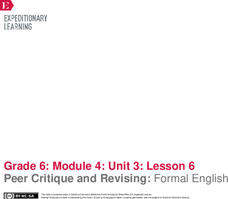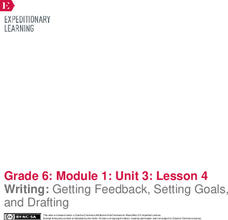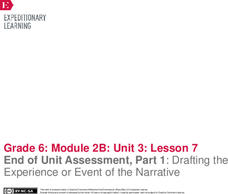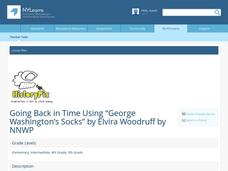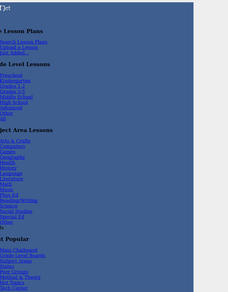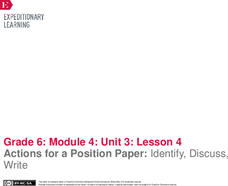EngageNY
Performance Task Preparation: Peer Critique and Mini-Lesson Addressing Common Errors: Revising Draft Essay to Inform
Time to revise! Using a writing evaluation rubric, scholars participate in a peer editing process to provide feedback on each others' informative essays. Next, pupils begin revising their drafts based on the feedback they receive.
EngageNY
Peer Critique and Revising: Formal English
Dear Sir or Madam: What's the difference between formal and informal language? Scholars focus on using formal English and transitions in their position papers. After revising their rough drafts, they engage in the peer editing process...
EngageNY
Mid-Unit Assessment: Completing My Draft Position Paper
What's the difference? Scholars analyze the similarities and differences between introductory and concluding paragraphs. Then, using a model essay as a guide, they write their draft position papers.
Waterford Union High School
Writing the Persuasive Essay
An excellent, in-depth resource would be an asset to your unit on writing an argument essay. It provides an explanation to each part of the essay as well as examples of transition words to strengthen your kids' writing. Additionally, the...
Curated OER
Draft Dilemmas
Consider the possibility of a new U.S. draft with this lesson, which encourages class debate and persuasive arguments. Middle and high schoolers discuss how such a draft might be enacted and how they would feel about it. They write...
Curated OER
Drafting the Declaration of Independence
Young scholars working in small groups to compare and contrast the rough draft of the Declaration of Independence written by Thomas Jefferson with the final version. They list the differences and decide on why the changes were made.
Curated OER
Advanced Practical Writing
Using a motivating topic as the focus, this activity has learners write an email as though they are describing their new house. English language learners read an example letter, and then practice their own writing skills by writing a...
Scholastic
Smart Quotes Mini-Lesson
Prepare for an interview project with a set of worksheets about asking questions and quoting people. After completing a grammar exercise about quotation marks, kids write out the questions they want to ask their interviewee, and record...
Curated OER
Rough Draft and Peer Edit of Oral Book Review
Pupils write a rough draft book review over a book they have finished recently. Using their peers, they revise and make suggestions to correct spelling and grammatical errors. In groups, they practice giving their book report to the...
Curated OER
Writing Pattern Books
Have your older learners assist young children with writing in this community service and literacy lesson. Middle schoolers become partners with a local elementary school. They assist the grade school children in writing a pattern book...
Curated OER
Advanced Practical Writing - A Letter to your Landlord
Looking for a letter writing worksheet? This worksheet provides a practical and realistic activity for your class. Learners write a brief letter to their landlord, who can be either real or imaginary, asking him or her to fix a problem...
EngageNY
Writing: Getting Feedback, Setting Goals, and Drafting
Why is it important to set goals as a writer? Scholars process feedback from their mid-unit assessments, writing down their strengths and weaknesses on index cards. Next, pupils use the feedback to begin drafting their hero's journey...
EngageNY
Planning for Writing: Introduction and Conclusion of a Literary Argument Essay
After completing three body paragraphs of an argument essay about life's rules to live by from Bud, Not Buddy Christopher Paul Curtis, it's time to begin writing the introduction and conclusion. Independently, pupils draft the final two...
EngageNY
End of Unit Assessment, Part 1: Drafting the Experience or Event of the Narrative
Don't be tone deaf. Scholars study two photographs to better understand the concept of tone, so they can incorporate the literary device into their writing. Additionally, they draft the experience or event portion of their personal...
State University of New York
Going Back in Time Using “George Washington’s Socks”
After reading Elvira Woodruff's George Washington's Socks, young readers and writers embark upon writing their own historically based story, with a focus on developing ideas and details throughout the piece. In small groups, class...
Class Antics
Leap Year: Write a Newspaper Article
Extra! Extra! Read all about leap year! Here, scholars write a newspaper article all about leap year/leap day from given facts including who, what, where, when, and why.
Curated OER
Revisiting Writing through Revision
Strategies to teach and motivate your students to revise their writing.
Curated OER
Narrative Writing Lesson
Sixth graders experience the stages of process writing, work cooperatively, to critique and to incorporate software tools to enhance writing and problem solving skills.
EngageNY
Actions for a Position Paper: Identify, Discuss, Write
Anchors aweigh, it's time to write! After viewing an anchor chart detailing the parts of a position paper, pupils share their plans for their essays with a partner. Next, they write the rough draft of their body paragraphs.
Curated OER
Collage to Writing
Practice expository and creative writing with your class. Pupils use magazines to find pictures, cut them out, and create a collage. This work of art is then used as a writing prompt. They describe the collage in either a creative or...
EngageNY
Planning for Writing: Introduction and Conclusion of a Literary Analysis Essay
First and last impressions are important. Using the helpful resource, scholars draft the introductory and concluding paragraphs of their literary analysis essays. Next, they use a writing evaluation rubric to self-assess their work.
EngageNY
End of Unit Assessment: Drafting the Informative Consumer Guide
Not all sandwiches are edible. Scholars use a Quote Sandwich graphic organizer to draft the written content of their informative consumer guides. Additionally, they view a mini-lesson plan on formal writing.
EngageNY
End of Unit Assessment, Part 2: Drafting Introduction and Conclusion of a Narrative
First and last impressions matter. Scholars compose the introductory and concluding sections of their narrative writing assignments. Also, to prepare for an upcoming performance task, pupils watch a modern-day monologue from the movie...
DocsTeach
Two Versions of FDR's Infamy Speech
Historians follow FDR's Infamy speech from rough draft to the official address to the Senate. An intriguing activity compares and contrasts FDR's original speech to the official version. Academics also listen to FDR address the Senate....

